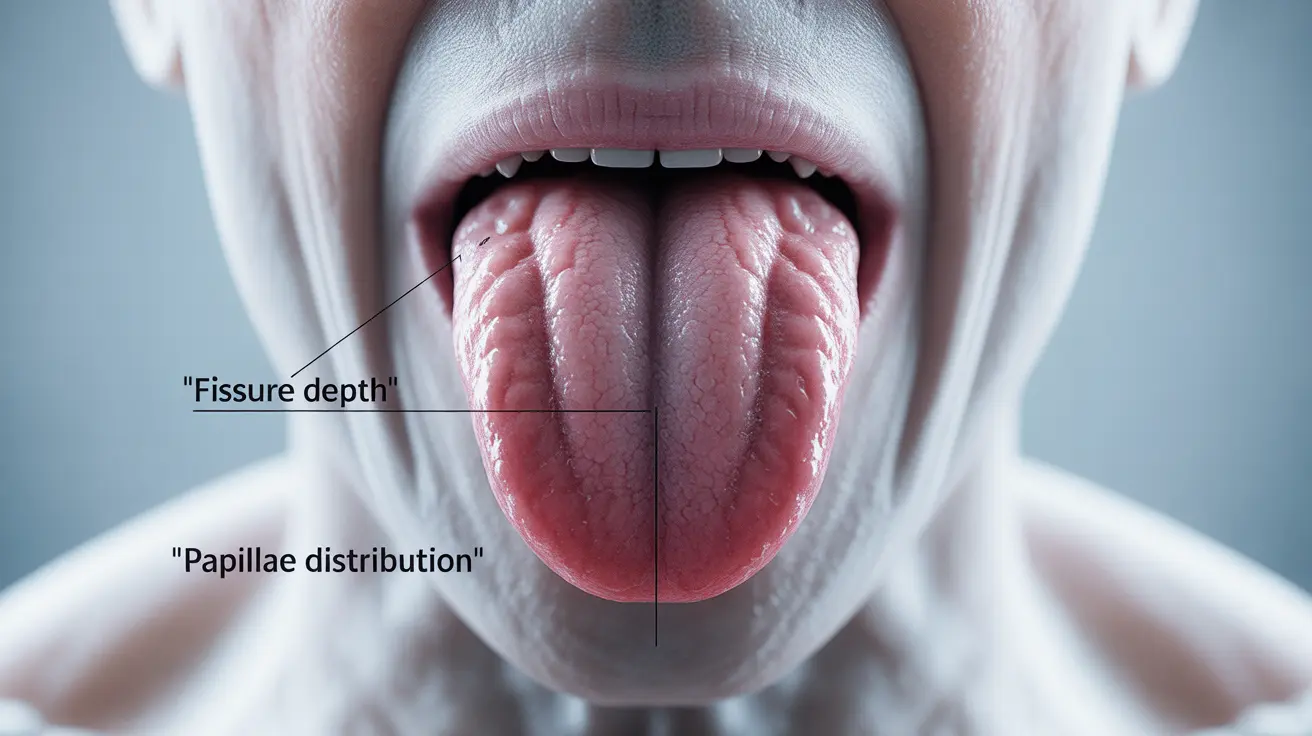Discovering cracks or fissures in your tongue can be concerning, but understanding their causes and proper care is essential for maintaining good oral health. These natural grooves or lines that appear on the tongue's surface can vary in depth and pattern, affecting people differently.
While some tongue fissures are a normal variation of anatomy, others might indicate underlying health conditions that require attention. This comprehensive guide will help you understand what causes these fissures, how to care for them, and when to seek professional medical advice.
What Are Tongue Fissures?
Tongue fissures are grooves or cracks that appear on the surface of the tongue. They can range from shallow lines to deeper grooves, sometimes creating a map-like pattern on the tongue's surface. While some people are born with a naturally fissured tongue, others may develop these changes over time.
These fissures typically appear on the top surface of the tongue and can sometimes extend to the sides. The depth and pattern of these grooves can vary significantly from person to person.
Common Causes of Tongue Fissures
Several factors can contribute to the development of cracks in the tongue:
- Genetic predisposition
- Age-related changes
- Vitamin deficiencies
- Dehydration
- Certain medical conditions
- Hormonal changes
Understanding these underlying causes is crucial for proper diagnosis and treatment. Some people may have a genetic predisposition to developing tongue fissures, while others might experience them as a result of nutritional deficiencies or other health conditions.
Signs and Symptoms
While tongue fissures themselves are often harmless, they can be accompanied by various symptoms:
- Discomfort or burning sensation
- Increased sensitivity to certain foods
- Difficulty maintaining proper tongue hygiene
- Food particles getting trapped in the grooves
- Associated white or red patches
- Occasional mild pain
Treatment and Care Options
Managing tongue fissures effectively involves several key approaches:
Proper Oral Hygiene
Maintaining excellent oral hygiene is crucial when dealing with tongue fissures:
- Regular gentle tongue cleaning
- Using a soft-bristled toothbrush
- Avoiding harsh mouthwashes
- Staying well-hydrated
Dietary Considerations
Making certain dietary adjustments can help reduce discomfort:
- Avoiding spicy or acidic foods when experiencing sensitivity
- Ensuring adequate vitamin and mineral intake
- Maintaining proper hydration throughout the day
- Consuming a balanced diet rich in essential nutrients
Prevention Strategies
While some tongue fissures are genetic or age-related, you can take steps to prevent worsening or complications:
- Regular dental check-ups
- Maintaining good oral hygiene
- Staying hydrated
- Addressing any underlying health conditions
- Getting regular nutrient testing if recommended by your healthcare provider
When to Seek Medical Attention
While most tongue fissures are benign, certain situations warrant professional medical evaluation:
- Severe pain or discomfort
- Persistent burning sensation
- Difficulty eating or speaking
- Changes in tongue color or texture
- Development of unusual patches or growths
- Worsening of existing fissures
Frequently Asked Questions
What causes cracks or fissures to appear on the tongue? Tongue fissures can develop due to genetic factors, aging, vitamin deficiencies, dehydration, or underlying medical conditions. Some people are born with them, while others develop them over time.
Are cracks in the tongue a sign of a serious health problem? While most tongue fissures are harmless variations of normal anatomy, they can sometimes be associated with underlying conditions. Regular monitoring and proper oral hygiene are important for maintaining tongue health.
How can I care for or treat a fissured tongue to prevent discomfort or infection? Maintain good oral hygiene, clean your tongue gently, stay hydrated, and avoid irritating foods. Using a soft-bristled toothbrush and maintaining proper hydration can help prevent discomfort and infection.
When should I see a doctor or dentist about cracks on my tongue? Seek medical attention if you experience severe pain, persistent burning, difficulty eating or speaking, or notice unusual changes in tongue color or texture.
Can a fissured tongue be linked to other medical conditions like diabetes or anemia? Yes, tongue fissures can sometimes be associated with various medical conditions, including nutritional deficiencies, certain syndromes, and systemic diseases. Regular medical check-ups can help identify any underlying conditions.




